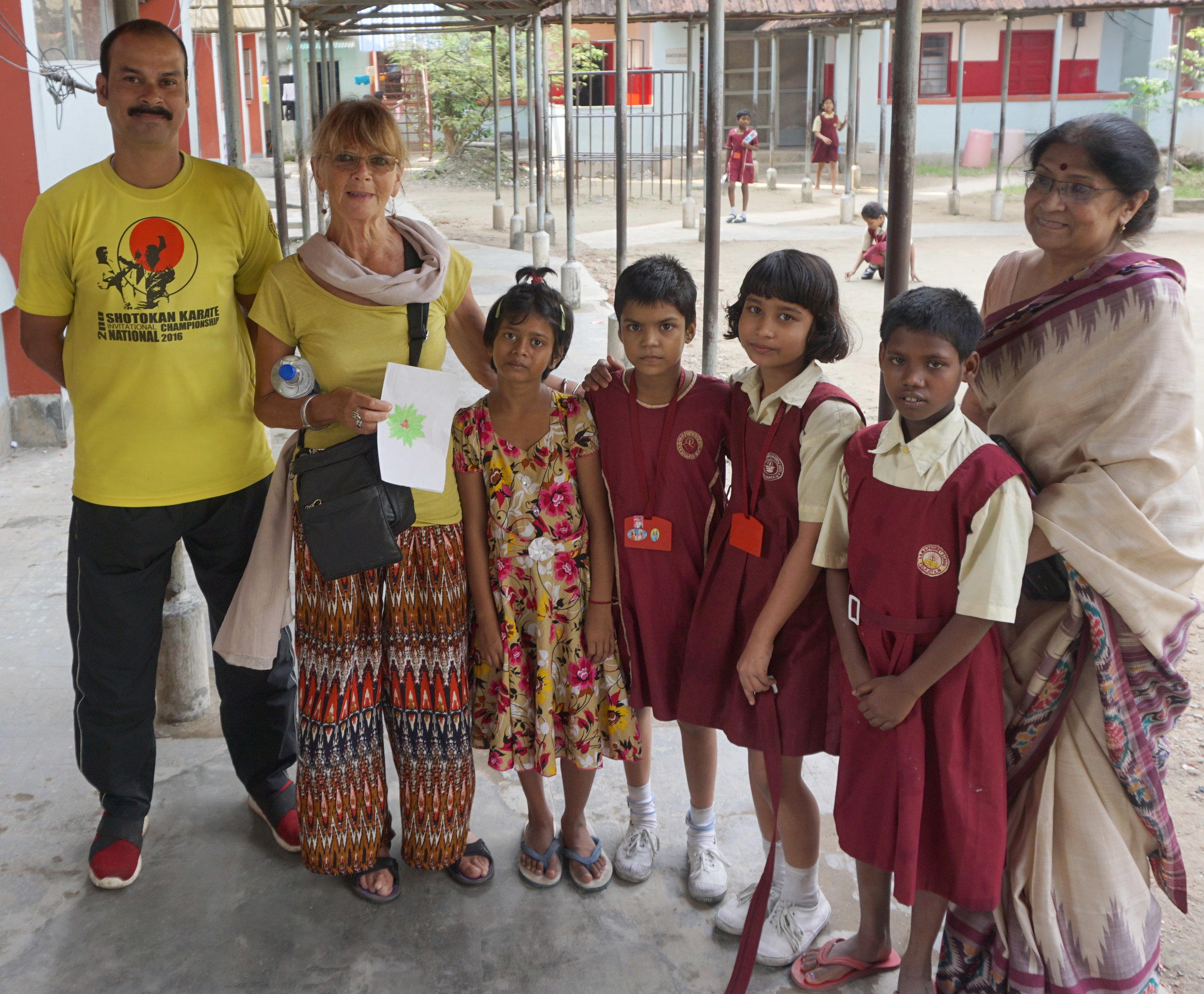INCH supports education
Once a year each child gets a set of new clothes, dresses for the girls, shorts and shirts for the boys – a day of great excitement
INCH is a small charity that has a cultural legacy and history of previous support work in India, based on projects that have always had a strong focus on education. A number of our Trustees have many years’ experience of working in education and particularly with charities in India to ensure maximum benefit and value for money. We work through our Indian partner, the Ramakrishna Vivekananda Mission (RVM), a long established Indian charity, working to improve the life chances of poor children, families, and the destitute.
Younger Girls dressed up for Diwali
Val (one of INCH's trustees) visiting a girls class
At the heart of our belief is that Education is ultimately the way out of the poverty trap for children born into poor families. Our major projects have involved the building and equipping of two schools, the sinking of bore wells, and installation of toilets and electricity. It is well accepted that children’s powers of concentration and ability to learn is inhibited when they are not fed. So ‘tiffin’ (a banana and biscuit for each child mid-morning) was provided and became an early project to support children’s ability to learn. The costings at the time (2009-2010) were based on- 1 banana per child per day, for one school year at 2p per child which converted to £995 for the year. The bananas, produced by local farmers, further supported the local community and although the children are not severely mal-nourished, many do suffer from rickets.
The Ideal School - Beldih
Ideal School at Beldih
The school, built in the heart of a small rural community in West Bengal is a non-faith school open to all, including Christian children. The founder of the school, Mohit Gorai, was himself sponsored through his education through ‘save a child’. He became a doctor and wanting to put something back into his own community, built the first 4 roomed school on his family land in the village, using his own resources but seeking support to maintain it through charity. The school was named The Ramakrishna Vivekananda Ideal School with some 30 children.
Boys in class
In 2009 the success of the first school prompted local farmers to donate land for a second, ‘middle’ school. The local community were anxious to have a school of its own to ensure that their children would not have to travel miles to attend secondary school. Thus, a second school, called the Ramakrishna Vivekananda Ideal Junior High School was opened in Autumn 2010, providing education for children beyond the age of 8 up to 14 years of age.
A renovation for this classroom
The bricks were made locally and women helped with the construction of the building.
A well was sunk in the grounds of the school to provide clean water for the children and toilets were also provided.
Fewer girls than boys attend school because in India, girls are not ‘valued’ in the same way as boys. However, INCH believes that in educating a girl, you are in fact, educating a family: women who have themselves accessed education will ensure the same opportunity is afforded to their own children.
To encourage the admission of more girls into school, one of the supported projects was to sponsor 20 girls through secondary education. In terms of future investment, you may well be looking at teachers, doctors and other professionals with whom you may come into contact.
A friend of INCH's on a visit from the UK stops in at the infants class
The increasing demand for more places meant that a second floor with another 4 rooms was added, providing places for up to 150 places. The children, mainly boys, are provided with school uniform produced by local people. Parents are charged some small amount if they can afford to pay, others who are unable to pay anything are subsidised.
4 girls with 2 teachers and visitor from the UK
The two schools at Beldih now provide education for some 430 pupils.
Our other partner organisation in Bengal is The West Bengal Women's Union which was started in 1932. The origin of the group lay in the fact that trafficking in women and children had increased to an unprecedented extent in between the two World Wars when the number of sailors and soldiers had increased considerably and the flesh trade found a ready and expanding market in West Bengal and Calcutta.
A group of like-minded women formed a unit to offer help to women and girls who were being exploited, abused and victimized, having been forced into prostitution. Their aim was to rescue the girls, women and their babies from the brothels and red light districts of Calcutta, and provide shelter, a home and an education in order to improve the life chances of these women. Sadly, the need exists as much today, where a culture exists that values women less than men.









